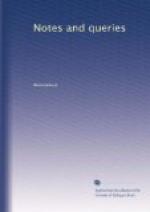ULRICH VON HUTTEN AND THE “EPISTOLAE OBSCURORUM VIRONUM.”
(Vol. ii., p. 55.)
I have never seen the article in the Quarterly Review to which your correspondent H.B.C. alludes: he will probably find it by reference to the index, which is not just now within my reach. The neat London edition, 1710, of the Epistolae was given by Michael Mattaire. There are several subsequent reimpressions, but none worth notice except that by Henr. Guil. Rotermund, Hanover, 1827, 8vo.; and again, with improvements, “cum nova praefatione, nec non illustratione historica circa originem earum, atque notitia de vita et scriptis virorum in Epistolis occurentium aucta,” 1830, both in 8vo.
The best edition, however, is that given by Dr. Ernst Muench, Leipsic, 1827, 8vo., with the following title:
“Epistolae Obscurorum
Virorum aliaque AEvi Decimi sexti Monimenta
Rarissima. Die Briefe
der Finsterlinge an Magister Ortuinus von
Deventer, nebst andern sehr
seltenen Beitraegen zur
Literatur-Sitten-und-Kirchengeschichte
des xvi’n Jahrhunderts.”
This contains many important additions, and a copious historical introduction. Both the editors write in German.
That this admirable satire produced an immense effect at the period of its publication, there can be no doubt; but that it has ever been thoroughly understood and relished among us may be doubted. Mr. Hallam, in his Literature of Europe, vol. i., seems to have been disgusted with the monkish dog-Latin and bald jokes, not recollecting that this was a necessary and essential part of the design. Nor is it strange that Steele, who was perhaps not very well acquainted with the history of literature, should have misconceived the nature of the publication, when we learn from an epistle of Sir Thomas More to Erasmus, that some of the stupid theologasters themselves, who were held up to ridicule, received it with approbation as a serious work:
“Epist. Obs. Viror. operae pretium est videre quantopere placeant omnibus, et doctis joco, et indoctis serio, qui dum ridemus, putant rideri stylum tantum, quem illi non defendunt, sed gravitate sententiarum dicunt compensatum, et latere sub rudi vagina pulcherrimum gladium. Utinam fuisset inditus libello alius titulus! Profecto intra centum annos homines studio stupidi non sensissent nasum, quamquam rhinocerotico longiorem."[8]
Erasmus evidently enjoyed the witty contrivance, though he affects to disapprove it as an anonymous libel. Simler, in his life of Bullinger, relates that on the first reading Erasmus fell into such a fit of laughter as to burst an abscess in his face with which he was at that time troubled, and which prevented the necessity of a surgical operation.




